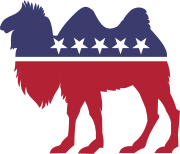
Back حزب المنع Arabic Прохибиционистка партия Bulgarian Prohibition Party German Prohibition Party Esperanto Partido de la Prohibición Spanish Parti de la prohibition French מפלגת האיסור HE Partito Proibizionista Italian 禁酒党 Japanese 금주당 Korean
Prohibition Party | |
|---|---|
 | |
| Chairman | Zack Kusnir |
| Founded | September 1, 1869 |
| Ideology | Temperance[1] Christian democracy Social conservatism |
| Political position | Syncretic Social: Center-right Fiscal: Center-left |
| Colors | Red, white and blue (national colors) |
| Seats in the Senate | 0 / 100 |
| Seats in the House | 0 / 435 |
| Governorships | 0 / 50 |
| State Upper Houses | 0 / 1,921 |
| State Lower Houses | 0 / 5,411 |
| Website | |
| www | |
The Prohibition Party is a political party in the United States known for its historic opposition to the sale or consumption of alcoholic beverages and as an integral part of the temperance movement. It is the oldest existing third party in the United States and the third-longest active party.
Although it was never one of the leading parties in the United States, it was once an important force in the Third Party System during the late 19th and early 20th centuries. The organization declined following the enactment of Prohibition in the United States but saw a rise in vote totals following the repeal of the Eighteenth Amendment in 1933. However, following World War II it declined, with 1948 being the last time its presidential candidate received over 100,000 votes and 1976 being the last time the party received over 10,000 votes.
The party's platform has changed over its existence. Its platforms throughout the 19th century supported progressive and populist positions including women's suffrage, equal racial and gender rights, bimetallism, equal pay, and an income tax.[2] The platform of the party today is more progressive on economic issues in that it supports Social Security and free education, but is conservative on social issues, such as supporting temperance and reforming immigration rules, thus making it communitarian.[1][3]
- ^ a b Lopez, German (October 28, 2016). "There's a Prohibition Party candidate running for president in 2016". Vox. Retrieved October 25, 2018.
- ^ "Page 9 Partisan prophets; a history of the Prohibition Party, 1854-1972".
- ^ James Hedges (June 2020). "Prohibition Platform incorporates a Consistent Life Ethic". National Prohibitionist. 10 (2). Mercersburg Printing: 4. ISSN 1549-9251.